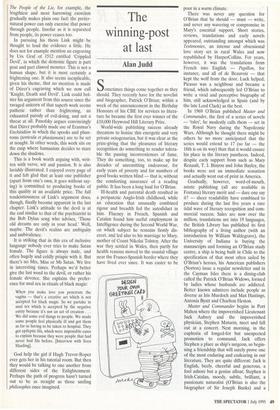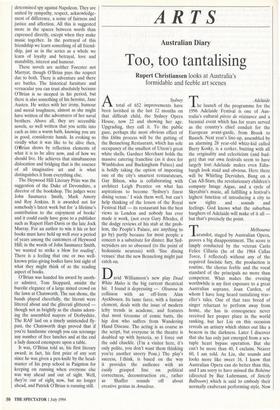The winning-post at last
Alan Judd
Sometimes things come together as they should. They recently have for the novelist and biographer, Patrick O'Brian; within a week of the announcement in the Birthday Honours of his CBE for services to litera- ture he became the first ever winner of the £10,000 Heywood Hill Literary Prize.
World-wide publishing success already threatens to lionise this energetic and very private octogenarian, but it was clear at the prize-giving that the pleasures of literary recognition do something to render tolera- ble the passing inconveniences of fame. They do something, too, to make up for decades of unremitting endeavour, for early years of poverty and for numbers of good books written blind — that is, without the comforting assurance of a reading public. It has been a long haul for O'Brian.
Ill-health and parental death resulted in a peripatetic Anglo-Irish childhood, while an education that unusually combined rigour and breadth fed the autodidact in him. Fluency in French, Spanish and Catalan found him useful employment in Intelligence during the Second World War, on which subject he remains firmly dis- creet, and led also to his marriage to Mary, mother of Count Nikolai Tolstoy. After the war they settled in Wales, then partly for health reasons moved to the coastal village near the Franco-Spanish border where they have lived ever since. It was easier to be poor in a warm climate.
There was never any question for O'Brian that he should — must — write, and never any wavering or compromise in Mary's essential support. Short stories, reviews, translations and early novels appeared, outstanding amongst which was Testimonies, an intense and obsessional love story set in rural Wales and now republished by HarperCollins. For years, however, it was the translations from French into English — Papillon, for instance, and all of de Beauvoir — that kept the wolf from the door. Luck helped; Picasso was a neighbour and became a friend, which subsequently led O'Brian to write a vivid and perceptive biography of him, still acknowledged in Spain (and by the late Lord Clark) as the best.
In 1969 O'Brian published Master and Commander, the first of a series of novels — 'tales', he modestly calls them — set in the Royal Navy during the Napoleonic Wars. Although he thought there might be others he no more anticipated that the series would extend to 17 (so far — the 18th is on its way) than that it would ensure his place in the literary pantheon. Indeed, despite early support from such as Mary Renault, T. J. Binyon and John Bayley, the books were not an immediate sensation and actually went out of print in America.
Gradually, however, word-of-mouth, astute publishing (all are available in Fontana) literary merit and — dare one say it? — sheer readability have combined to produce during the last five years a rare tidal wave of literary recognition and com- mercial success. Sales are now over the million, translations are into 19 languages, the British Library has published its first bibliography of a living author (with an introduction by William Waldegrave), the University of Indiana is buying the manuscripts and forming an O'Brian study centre, a ship is being built in Chile to the specification of that most often sailed by O'Brian's heroes, his American publishers (Norton) issue a regular newsletter and in the Cayman Isles there is a dining-club called the Patrick O'Brian Widows, formed by ladies whose husbands are addicted. Better known admirers include people as diverse as Iris Murdoch and Max Hastings, Antonia Byatt and Charlton Heston.
Master and Commander begins in Port Mahon where the impoverished Lieutenant Jack Aubrey and the impoverished physician, Stephen Maturin, meet and fall out at a concert. Next morning, in the euphoria of longed-for but unexpected promotion to command, Jack offers Stephen a place as ship's surgeon, so begin- ning a friendship that will surely prove one of the most enduring and endearing in our literature. They are quite different: Jack is English, beefy, cheerful and generous, a fool ashore but a genius afloat; Stephen is Irish-Catalan, moody, subtle, brilliant, a passionate naturalist (O'Brian is also the biographer of Sir Joseph Banks) and a determined spy against Napoleon. They are united by sympathy, respect, acknowledge- ment of difference, a sense of fairness and justice and affection. All this is suggested more in the spaces between words than expressed directly, except when they make music together. In the portrayal of this friendship we learn something of all friend- ship, just as in the series as a whole we learn of loyalty and betrayal, love and mutability, interest and humour.
These novels are neither Forester not Marryat, though O'Brian pays the respect due to both. There is adventure and there are battles. The historical furniture and vernacular you can trust absolutely because O'Brian is so steeped in his period, but there is also something of his heroine, Jane Austen. He writes with her irony, humour and moral toughness, almost as she might have written of the adventures of her naval brothers. Above all, they are accessible novels, so well written that you settle into each as into a warm bath, knowing you are in good, considerate hands. In evoking so vividly what it was like to be alive then, O'Brian shows by reflection elements of what it is to be alive now, and of how we should live. He achieves that simultaneous dislocation and bridging that is the essence of all imaginative art and is what distinguishes it from everything else.
The Heywood Hill Literary Prize was the suggestion of the Duke of Devonshire, a director of the bookshop. The judges were John Saumarez Smith, Mark Amory and Roy Jenkins. It is awarded not for somebody's latest work but for 'a lifetime's contribution to the enjoyment of books' and it could easily have gone to a publisher such as Rupert Hart-Davis or the late Jock Murray. For an author to win it his or her books must have held up well over a period of years among the customers of Heywood Hill; in the words of John Saumarez Smith, `we wanted to strike a blow for reading'. There is a feeling that one or two well- known prize-giving bodies have lost sight of what they might think of as the reading aspect of books.
O'Brian was handed his award by anoth- er admirer, Tom Stoppard, amidst the bucolic elegance of a large mixed crowd on the lawn at Chatsworth. The sun shone, the bands played cheerfully, the literati were littered about and the gliterati glittered though not as brightly as the chains adorn- ing the assembled mayors of Derbyshire. The RAF laid on a timely unintended fly- past, the Chatsworth dogs proved that if you're handsome enough you can scrounge any number of free lunches and at the end a lady danced extempore upon a table.
It was, O'Brian told us, his first literary award; in fact, his first prize of any sort since he was given a pen-knife by the head- master of his prep school in Paignton for keeping on running when everyone else was way ahead and out of sight. Well, they're out of sight now, but no longer ahead, and Patrick O'Brian is running still.



































































 Previous page
Previous page